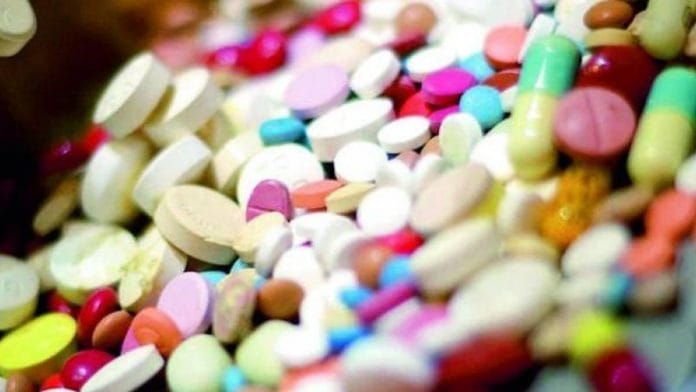New Delhi: A Delhi High Court order has forced the central government to modify a notification issued in June this year that banned the manufacture and sale of 14 fixed-dose combination (FDC) drugs over lack of “therapeutic justification”.
In the revised government notification issued last month, drugmakers have been allowed to exhaust their existing stock that was in the distribution network when the Union health ministry issued the 2 June gazette notification banning the FDC drugs. The June order was issued on the recommendations of an expert committee.
ThePrint has seen a copy of the modified notification.
FDC drugs are those that contain a combination of two or more active pharmaceutical ingredients (APIs) in a single form, usually manufactured in a fixed ratio (the molecules in a particular ratio).
The drugs banned in the notification included many medicines used for treating cough, common infections, fever and body ache, and had combinations such as nimesulide and paracetamol dispersible tablets, chlorpheniramine and codeine syrup, and salbutamol and bromhexine, among others.
Following the 2 June government notification, a number of pharmaceutical companies, including Lupin, Glenmark, Cipla and Intas, filed petitions in the Delhi High Court the same month, seeking an order or direction to set aside the ban.
The HC, in its final order delivered in the matter in July, said the health ministry notification “only states that the FDC (drugs) may involve risk in human beings without specifying the reasons/extent and the nature”.
“In addition, the FDC (drugs) have been in the market since 1988,” it added.
The court further directed that the FDC drugs “which are already in the distribution channel shall not be withdrawn”.
A senior health ministry official told ThePrint last week: “We are now allowing pharma companies to sell their existing stock of the banned FDC drugs in the wake of the latest court order.”
“It may take months, in some cases even more than a year, before the banned FDC drugs go out of the market,” the official added.
A pharmaceutical expert who has been fighting against the “irrational use” of FDC drugs pointed out that the argument that these drugs have been in use for nearly 30 years and, therefore, may continue to be used, was not scientific.
“The answer to this argument is that the absence of evidence of harm is not evidence of absence of harm,” the expert, who did not wish to be named, told ThePrint.
“The fact is we simply did not have a system of pharmacovigilance 30 years ago and could not show how the drugs do harm,” he added.
Also Read: Budget gives 200% boost to pharma sector as govt looks to curb dependence on China
344 drug combinations were first banned in 2016
The 14 banned FDC drugs were part of 344 drug combinations that were first banned in 2016 by the Centre after an expert panel, constituted by the Supreme Court, declared them “irrational”, and found that they were marketed to patients without scientific data proving their efficacy and safety.
The 2016 ban came after a case was filed in the SC by the All India Drug Action Network (AIDAN), an independent network of several NGOs working to increase access and improve rational use of essential medicines.
AIDAN said that all pharma companies in India are required to secure marketing approval from the Central Drugs Standard Control Organisation (CDSCO) — which requires them to submit a therapeutic justification for a drug — before obtaining a manufacturing licence from state drug administrations.
In case of FDC drugs, however, the companies had secured a manufacturing licence from state authorities without getting a marketing licence from the CDSCO, it added.
The government’s 2016 ban notification was challenged in the Delhi High Court by some pharma companies for 15 drugs. The companies said these drugs were launched prior to 1988, when the rule mandating marketing approval by the CDSCO for every drug came into force.
The court had then directed the health ministry to constitute a committee to look into the case of these 15 drugs.
Fourteen out of the 15 drugs in the list were banned through the notification issued in June, based on the committee’s recommendations.
(Edited by Nida Fatima Siddiqui)
Also Read: Pharma industry warns of Covid drug shortages as raw materials prices surge 200%






